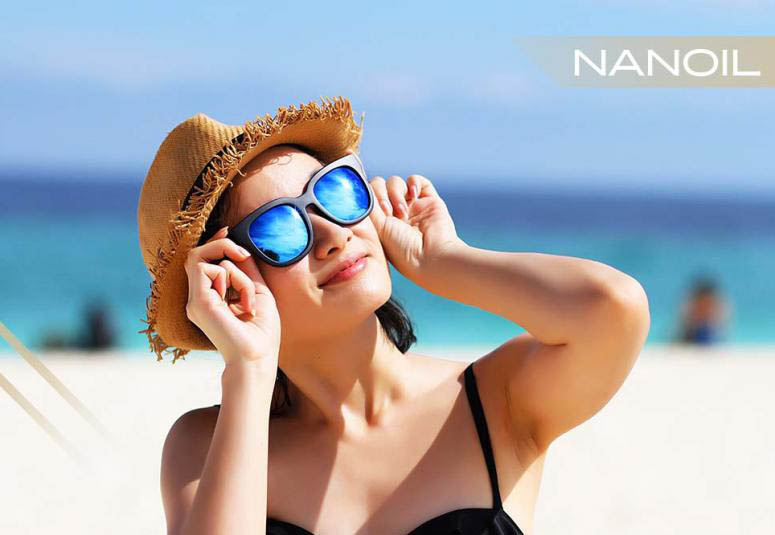- NANOIL Products
- Oils
- Face serums
- Hair masks
- Shampoos
- Hair conditioners
- Hair styling
- Care
- Hair Porosity Test
- Blog
- Contact

What is photoaging? How can you guard your skin from it? This topic affects all of us. Even if it's never crossed your mind - sun protection does matter. Why? What happens if you don't protect your skin from the sun? Keep reading for the answers.
A pleasant and warm kiss of the sun lulls us into a false sense of security. Especially the first warm days in the spring. We must remember, though, that UV radiation is dangerous and exposure to the sun without proper shielding is risky - no matter the season of the year or the skin type. The solar radiation may lead to skin cancer, and it is a cause of skin photoaging.
The definition for photoaging is simple. It is «damage to the skin structures from the chronic exposure to the ultraviolet radiation». Simply put, it comes down to skin that ages from the sunlight - it loses firmness, healthy shine and even tone. If you wonder what photoaging is, we can sum it up saying it's a bad effect of not using a sunscreen.
Did you know...?
Photoaging is a process that occurs from natural light but also from an artificial source of light like sunbeds for example.
Chronic sun exposure - let's face it, we're exposed to the sunlight nearly every day - causes our skin to age prematurely. The photoaging process, that is a slow damage to the skin cells, starts off. The sun destroys, among others, collagen and elastin fibers which maintain skin firmness, as well as causes overgrowth of sebum glands and hardens the epidermis. UV rays additionally disturb the production of melanocytes, or cells that produce melanin, which results in tanning (intensified pigment production) but also pigmentation spots when the sunlight is more intense.
The most popular symptoms of photoging include:
To avoid such problems, we must protect our skin from the sun. Using an effective face sunscreen is the best tactic to adopt. In line with a rule saying prevention is better than cure, we should counteract photoging using suitable products. There are different ways for stopping the sun damage to the skin. We can shield it using clothes (preferably, natural, airy fabrics), hats or an umbrella. Still, staying in the shadow isn't fully effective because UV rays can get through most fabrics. Therefore, SPF products seem to be the best choice.
Must-know!
People with moles, scars and pigmentation spots should provide their skin with the most tender care. Sun protection is necessary in the case of such imperfections!
Once you learn the damaging effects of UV radiation, you start wondering what's best for protection. You start searching for remedies to stave off photoaging. What's worth using? Which sun protection products work best? How to shield the face from UV radiation? There are a few answers and paths you can take.
FACE CREAM
Reaching out for a face cream is the easiest way for sure. However, not every cream provides an effective shield from the sun. Actually, most moisturizers don't give any protection from the sunlight. To have such properties, your facial cream must be rich in UV filter - chemical or physical, not much difference between them. It's good to make all-year-round sun protection a habit because it's necessary even in the winter, especially when you go to the ski slope.
VITAMIN C FACE SERUM
Natural vitamin C is very effective at protecting the skin from the sunlight. Not each form of it, though. It should be a stable type like ethyl ascorbic acid which is not oxidized and thus has a possibility of revitalizing the skin as well as delivering protection from UV rays. Using a facial serum including this form of vitamin C is a brilliant idea letting us avoid the wrinkles, hyperpigmentation and dull skin, that is all damage caused by the sun.
You want to protect your face from the sun and stave off photoaging? Choose:
NATURAL OILS FOR FACE CARE
Natural beauty oils effectively shield from the sunlight as well. Raspberry seed oil, argan oil and almond oil fulfill this task best. Some of them boast a really high SPF (from 30 to 40). If you use it as your make-up base or simply apply it regularly in your daily skincare routine, then the risk of photoaging will be lower.
The best oils for sun protection:
PROTECTIVE FACE MIST
You can also try face mists which have additional properties that guard against the sunlight (naturally, they must include sun protection factor). Such sprays don't make the best choice because they quickly evaporate and produce poor effects, but if you like to use face mists in the summer for freshening, choose the ones rich in protective substances. They will act as an additional product shielding the skin.
SPF-RICH MAKE-UP PRODUCTS
Anti-UV make-up products like BB creams, foundation or mineral powders are growing in popularity. They make a very good choice because the easiest way to prevent photoaging is to protect the skin all day in any conditions.
There's one more question. Can you improve sun-damaged skin? There are different kinds of antiaging treatments and procedures and they can be used also when wrinkles or hyperpigmentation are caused by the sun. The most popular therapies and salon treatments that lessen the symptoms of photoaging include:
- hyaluronic acid fillers or botox
- IPL laser therapy
- mesotherapy and microdermabrasion
تعليقات: #0